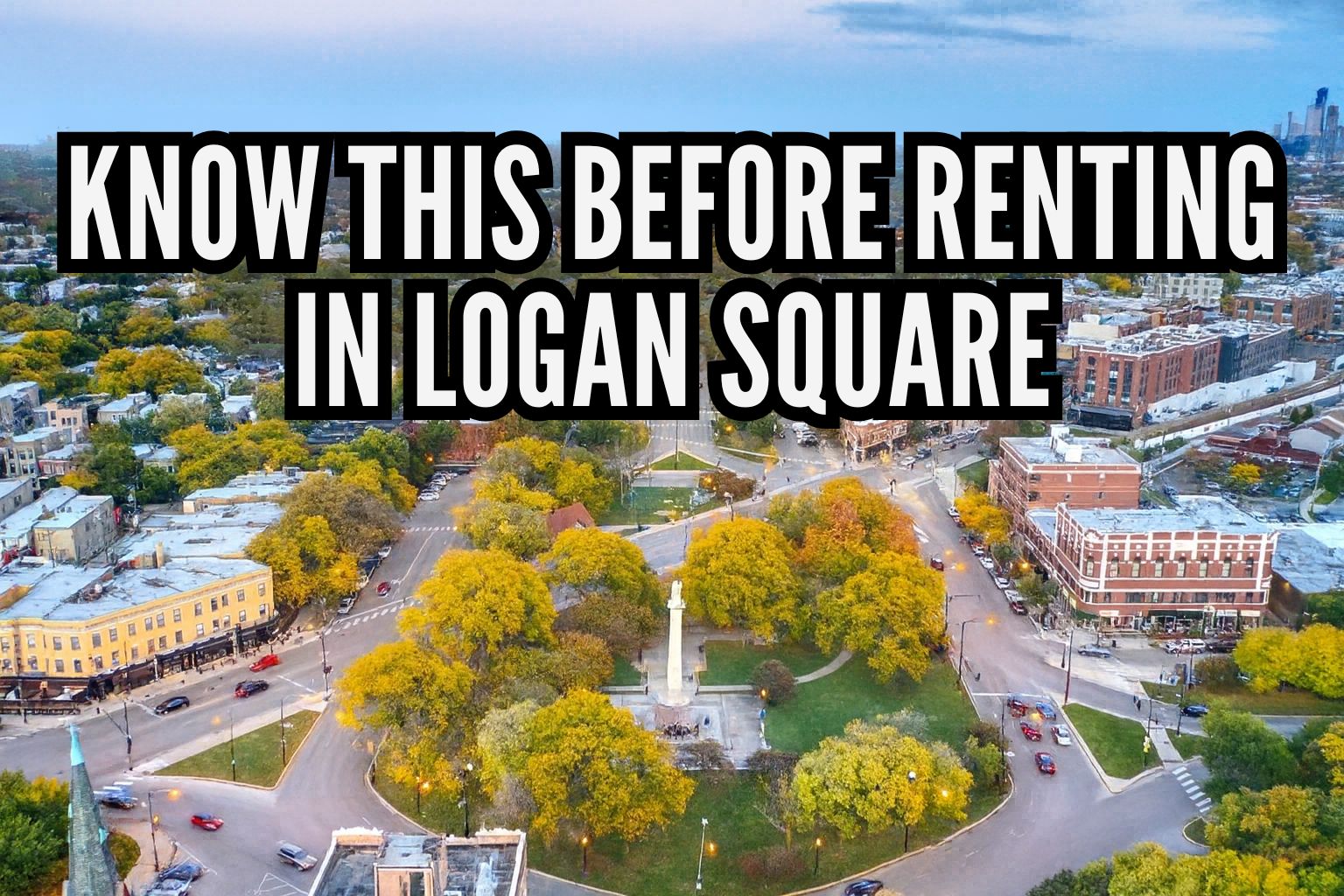
Author: Mark Ainely | Partner GC Realty & Development & Co-Host Straight Up Chicago Investor Podcast
If you’ve ever asked yourself “Is now a good time to rent out my Logan Square condo?” or “How much could I get for my condo or apartment on the boulevard?”, you’re not alone. As a partner at GC Realty & Development and co-host of the Straight Up Chicago Investor Podcast, I field questions like these every day. After two decades of leasing homes in Chicago’s north-side neighborhoods, including dozens of properties in Logan Square, I’ve learned that success isn’t just about posting a listing and hoping for the best. It’s about timing, pricing and understanding how the local market moves.
Logan Square isn’t your typical neighborhood market. This eclectic neighborhood on the northwest side of Chicago is known for its historic boulevards, independent shops and booming restaurant scene. Renters here include young professionals, artists and families who appreciate the area’s walkability and access to the Blue Line. To lease your property quickly, for the right price, and without legal headaches, you’ll need a strategy grounded in current data and practical experience.
Here I’ll break down three critical components every Logan Square landlord should understand:
Market timing expectations – How long it typically takes to secure a lease for condos, townhomes and single-family homes, and why days on market matter.
Rental price ranges – Realistic rent bands for different property types in 2025, plus factors that push your property up or down in those ranges.
Seasonal rental patterns – When demand peaks and slows, and how to structure leases to take advantage of those cycles.
How Long Will It Take to Get a Lease Signed?
Vacancy is the silent killer of rental returns. Every day your property sits empty, it eats into your cash flow. Understanding typical leasing timelines lets you budget realistically and avoid panic price cuts.
Citywide / neighborhood timing (2025): Current market measures show multifamily units (condos & apartments) averaging roughly 14–21 days on market, while single-family homes show a wider range, commonly 17–31 days depending on season and condition. Logan Square usually tracks or slightly outperforms the city multifamily pace when units are priced and presented properly.
Practical expectations by property type:
Condos & Smaller Apartments (1–2 Bedrooms)
Typical timeline: 2–3 weeks. Updated one-bedroom condos and two-bedroom flats with modern kitchens, in-unit laundry and proximity to transit rent the fastest.
Why it can drag on: Dated finishes, poor photos or unrealistic pricing. Carpet, older appliances or limited showing availability slow things down.
My advice: Invest in professional cleaning, fresh paint, updated light fixtures and good photography. Highlight perks like gated parking, rooftop decks or bike storage. Price at market , not at your emotional break-even.
Townhomes & Duplexes (2–3 Bedrooms)
Typical timeline: 3–4 weeks. These units attract roommates and young families who take more time weighing commute, school and outdoor space.
Why it can drag on: No parking, deferred maintenance, or overpricing. Duplexes with awkward utilities or access issues can be harder to place.
My advice: Boost curb appeal, emphasize private outdoor space or separate sleeping areas for roommates, and consider pet-friendly terms (with a pet fee) to widen your applicant pool.
Single-Family Homes (3+ Bedrooms)
Typical timeline: 3–6+ weeks. Single-family homes show the biggest spread , in midsummer they can lease quickly, in winter they may take a month or more. If a house is still vacant after 45 days, that usually signals a pricing or presentation problem.
Why it can drag on: Overpricing is the number one issue. Inadequate marketing, weak photos, or failing to advertise across platforms also hurt.
My advice: Hire a pro photographer, write a family-focused listing (fenced yard, off-street parking, updated kitchen, proximity to parks/schools), and price competitively from day one. In winter, consider a slightly longer lease (15 months) to move your next turnover into the spring/summer window.
Why These Timelines Matter
Knowing the typical leasing window helps you plan vacancy reserves and marketing cadence. A condo that hasn’t rented after 10 days doesn’t automatically need a price cut, give it the full 2–3 week window. Conversely, a single-family home vacant after 45 days needs a hard look at price or presentation. Expect faster leasing in peak months and slower pace in deep winter.
What Can You Charge? Rent Ranges by Property Type (2025)
Pricing your rental is half art and half market science. Below are realistic 2025 rent bands for Logan Square, plus quick tips on what moves rent up or down.
Neighborhood snapshot: Logan Square’s average apartment rent sits near $2,100–$2,200 as a quick neighborhood median reference. Use local comps on the day you price to refine these bands.
Updated ranges by property type (2025 guidance):
Condos & 1–2 bedroom apartments: $1,600 – $2,400. Typical 2-bedroom medians cluster around $2,100–$2,300 depending on updates and parking. Well-appointed units with laundry and parking push to the upper part of the range.
Townhomes / duplexes / 2–3 bedroom flats: $2,300 – $3,200. Smaller two-beds sit low in the band; updated 3-beds and townhomes with private outdoor space or garages push higher.
Single-family homes (3–4+ bedrooms): $2,500 – $4,500+. Many 3-bed houses cluster in the mid-$2k’s; renovated 4-beds and new builds commonly command $3,500+, with some premium homes exceeding $4,000.
Factors that influence rent:
Location within Logan Square: Proximity to Logan Boulevard, Palmer Square, the Blue Line, 606 Trail or popular restaurant corridors adds premium value.
Condition & updates: Renovated kitchens, updated baths, hardwood floors and modern systems meaningfully increase rent.
Amenities & parking: In-unit laundry, off-street parking or garage spots, central AC, rooftop decks or outdoor space justify higher pricing.
Pet policy: Allowing pets expands demand; charge a pet fee or modest rent premium to compensate.
Utilities & furnishings: Including heat, water, or offering a furnished unit can often let you ask 5–10% more than an unfurnished, utilities-separate comparable.
Actionable step: Don’t guess. Run a Free Rent analysis and get a competitive rent rate.
Timing Your Lease: Why Seasonality Matters
Chicago’s rental market is strongly seasonal and Logan Square follows the same cadence:
Peak Season, May through September: Best time to list. Weather, school schedules and corporate moves concentrate demand; units often lease faster and can command top-of-market prices.
Shoulder Seasons, March–April and October: Still active demand, but inventory balances more. Good time to capture renters who missed peak season.
Slow Season, November through February: Cold weather and holidays slow moving activity; listings can sit longer and may need incentives to move.
Practical tips:
Structure lease expirations toward spring/summer when possible.
Market your unit 30–60 days before availability to build an applicant pipeline.
If you must list in winter, be realistic on price or offer small incentives (a free parking month, flexible move-in dates, etc.) to attract qualified tenants.
Licensing and Legal Requirements (Don’t Skip This)
Getting the legal side wrong invites major headaches. Here’s what Logan Square landlords must know in 2025.
Chicago Residential Landlord & Tenant Ordinance (RLTO)
The Chicago Residential Landlord & Tenant Ordinance (RLTO) is one of the strongest tenant protection frameworks in the country. Many landlords unintentionally run into trouble not because they ignore the law, but because of small oversights that count as violations. Here are a few of the biggest ones that regularly trip up housing providers in Logan Square:
Flood Disclosure
If your unit has ever experienced flooding, you are required to disclose this in writing to prospective tenants. This includes basement seepage or repeated water intrusion issues. Failing to disclose—even if you’ve fixed the problem—can open the door to legal claims down the road.Habitability Issues
The RLTO requires that all units remain in “habitable” condition. That means functioning heat, plumbing, electricity, and compliance with local building codes. If you know of issues like mold, broken windows, unsafe stairways, or pest infestations, you must disclose them before signing a lease. Not doing so could be considered misrepresentation.Neighborhood-Specific Rules – Northwest Side Preservation Act
In Logan Square, landlords also need to stay aware of broader legislative overlays, like the Northwest Side Preservation Ordinance. This includes right-of-first-refusal rules and demolition fees that can affect investment decisions. If you’re leasing or repositioning property, make sure you understand how this act could impact your long-term plans.Heat Ordinance
Chicago’s heat ordinance requires landlords to maintain minimum indoor temperatures from September 15 through June 1 (68°F during the day and 66°F overnight). Tenants often know their rights here, and violations can escalate quickly into city citations or rent reductions. Proactively service your HVAC or boiler systems before winter and provide backup solutions if repairs are delayed.
Cook County Just Housing Amendment (JHA)
The JHA applies across Cook County (so it covers Logan Square). It requires a two-step screening process: you must first evaluate neutral qualifications (income, rental history, credit, etc.) and only after a conditional approval may you consider criminal history.
If criminal history is considered, landlords must perform an individualized assessment, consider the nature/severity of the offense, and allow applicants to dispute inaccuracies. Blanket bans or advertising exclusions based on criminal history are unlawful under JHA guidance.
Security Deposits vs. Non-Refundable Move-In Fees
Many Chicago landlords use a non-refundable move-in fee (clearly labeled in the lease) instead of a traditional deposit to avoid RLTO account/interest administrative burdens. That practice remains common in 2025.
Important: You cannot charge both a security deposit (as defined under RLTO) and an undisclosed or improperly labeled move-in fee for the same tenancy. Be transparent in the lease and label fees properly.
Watch legislation: There has been movement in Springfield and local reporting on proposals to limit or require disclosure for move-in fees. Stay current on state law changes.
Frequently Asked Questions (Logan Square landlords)
How long does it take to rent a condo in Logan Square?
Well-priced condos and smaller apartments generally lease within 2–3 weeks in a normal market window. Outdated or over-priced units can take a month or more.
What should I charge for my Logan Square rental?
Use the updated bands above. A quick rule of thumb for 2025: typical 2-bed = $2,100–$2,300, typical 3-bed = $2,600–$3,000, and single-family homes frequently start in the mid-$2k’s with renovated units pushing past $3,500–$4,000.
Is the Logan Square rental market seasonal?
Yes. Peak demand runs May–September, shoulders are March–April and October, and November–February is slow. Timing your lease and marketing around these windows helps maximize rent and minimize vacancy.
How do I minimize vacancy?
Price competitively, use professional photography and strong listing copy, allow pets if practical, and market 30–60 days ahead of availability. If a listing is stale after its expected window, adjust price or offer a modest incentive.
Are there licensing requirements for Logan Square rentals?
There is no blanket city rental license for long-term residential units in Chicago, but you must comply with the Chicago RLTO, Illinois Security Deposit Act and the Cook County Just Housing Amendment. Short-term rentals (Airbnb) require separate city licensing.
Should I collect a security deposit or a non-refundable move-in fee?
Both are legal when handled properly, but the RLTO imposes strict rules on security deposits (separate interest-bearing account, receipts, interest payments, and return within 45 days). Many landlords prefer a clearly disclosed non-refundable move-in fee to avoid RLTO administrative risk, but don’t charge both for the same tenancy ,and watch for pending state law changes.
Where can I learn more about the legal requirements?
Consult the RLTO materials, Cook County JHA guidance, and our RTLO ebook for a plain-language breakdown. If you have questions about how to structure fees or screening to comply with JHA, consult an attorney or a trusted property manager.
Should I self-manage or hire a property manager?
Managing a rental includes marketing, screening, maintenance coordination, rent collection and legal compliance. If you prefer hands-off ownership, a professional manager often charges 7–9% of the monthly rent, a cost that can pay for itself through lower vacancy rates, stronger comps, and fewer legal missteps.
Final Thoughts
Being a landlord in Logan Square offers both opportunity and complexity. To succeed, treat your rental like a business: understand realistic leasing timelines, set competitive prices based on current comps, align leases with seasonal demand when possible, and obey county and city rules. A condo that rents quickly at market price is far more valuable than one that sits vacant at an inflated number. If you’d rather leave the details to experts, GC Realty & Development can help with tenant placement and full-service property management.
Use our Free Rent Analysis tool for an instant, data-driven pricing recommendation and download our RTLO ebook to ensure your lease language complies with Chicago and Cook County rules.
Capitalize On Your Team
We’ve shared a lot of information here on investing in real estate locally in Chicagoland. If you live outside the area, it may seem overwhelming for those wanting to invest in the Chicago market. But we really just look at it as a team sport.
Who’s on your investing team? Do you even have a team? GC Realty & Development, LLC has a dedicated team of professionals willing to share decades of experience in all facets of real estate investment. We handle everything from brokerage, leasing, and property management. Whether you hire us or not, we’re happy to provide our resources and expertise.
What gets me up in the morning and keeps me going 12 hours a day is the ability to add value to local area investors in Chicago and beyond! Those who connect with me often hear me say that our goal is to bring value to everyone we come in contact with.
We hope that in return, they will one day hire us for our tenant placement or property management services, refer us to someone they know, or leave a review about our services. We would clearly love all three; however, we’re happy whenever we get the opportunity to help!
Reach out today!

Partner / Co-Host of Straight Up Chicago Investor Podcast

 Vendor Portal
Vendor Portal



